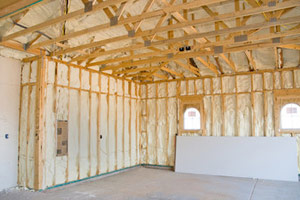Spray Foam Insulation
Transforms Your Home’s Energy Efficiency
Reed’s Home Solutions specializes in professional spray foam insulation installation that transforms your home’s energy efficiency and comfort levels throughout Kentucky, West Virginia, Tennessee, and Virginia. Our expert team uses both open-cell and closed-cell spray foam technologies to create superior thermal barriers that outperform traditional insulation materials. With R-values ranging from 3.5 to 7 per inch depending on the foam type selected, our spray foam insulation provides long-lasting protection against energy loss, moisture infiltration, and air leakage that can compromise your home’s comfort and increase utility costs.
- Reduces heating and cooling costs by up to 15% through superior thermal performance and complete air sealing capabilities
- Prevents moisture damage and mold growth with excellent vapor barrier properties that protect your home’s structural integrity
- Eliminates drafts and cold spots by expanding to fill gaps and cracks that traditional insulation cannot reach
- Provides long-term durability with a lifespan of 10-15 years minimum without settling or degrading performance
- Enhances indoor air quality by creating an effective barrier against outdoor pollutants and allergens
Choosing the Right Spray Foam Insulation
Selecting the right spray foam insulation depends on your home’s specific needs and environmental conditions. Open-cell spray foam offers excellent sound dampening properties and cost-effective coverage for interior applications, while closed-cell foam provides superior moisture resistance and structural support for exterior walls and moisture-prone areas.
Our insulation specialists evaluate factors such as your home’s construction, climate exposure, and performance goals to recommend the most suitable foam type. We ensure proper installation techniques that maximize the foam’s expansion properties and create seamless thermal barriers that deliver consistent energy savings year after year.

Where to Insulate?
Featured Services
High energy bills, water intrusion, and foundation problems don’t resolve themselves and typically worsen over time, leading to increased costs and potential safety concerns. Reed’s Home Solutions provides three essential services that address these common commercial building challenges with proven, professional solutions.
Attic Insulation
- Maintains consistent temperatures by preventing heat transfer through your roof and ceiling areas
- Reduces ice dam formation during winter months through proper thermal barrier creation
- Controls moisture and condensation that can lead to mold growth and structural damage
Basement Insulation
- Eliminates cold basement floors and walls through comprehensive box sill and foundation wall coverage
- Prevents moisture infiltration that causes musty odors and creates unhealthy living conditions
- Creates usable living space by maintaining comfortable temperatures in previously unusable areas
Crawl Space Insulation
- Provides complete encapsulation that transforms damp, problematic crawl spaces into dry, conditioned areas
- Prevents ground moisture from entering your home through comprehensive vapor barrier protection
- Improves overall home comfort by eliminating cold floors and drafts from below
Garage Insulation
- Protects adjacent living spaces from temperature extremes and automotive fumes
- Reduces energy loss through shared walls between your garage and conditioned home areas
- Creates more comfortable workspace for year-round garage activities and storage
Home Energy Audit
- Significant cost savings – Identify energy waste that can reduce utility bills by 15-30% annually
- Advanced diagnostic testing – Blower door tests and infrared imaging reveal hidden energy loss areas
- Prioritized improvement plan – Detailed recommendations ranked by cost-effectiveness and impact
Schedule Your Free Inspection
Our certified specialists will inspect your home, explain the problem, and provide a no-obligation estimate. Get started by filling out the form below.
Home Energy Audit
Our certified energy specialists conduct thorough home energy audits to identify every opportunity for insulation improvements that can enhance your home’s efficiency and comfort. We use advanced diagnostic equipment including infrared cameras and digital manometers to locate thermal bridging, air leakage points, and areas where existing insulation has failed or settled. This detailed assessment allows us to prioritize insulation upgrades that will deliver the greatest energy savings and comfort improvements for your investment. Ready to discover how much you could save with proper insulation?
Learn more about our detailed Home Energy Audit process. Schedule your free assessment today.
Related Job
Job completed for Attic and crawlspace project-Delbarton, WV
Completion date: September 14, 2022
Location: Burnsville, NC
Why did the customer contact us?
The customer recently moved to the area and purchased this home, which was in desperate need of better insulation. The customer’s goals were making the home more comfortable and energy efficient at the same time.
Solutions provided:
In the crawlspace area, we covered the earth with a 30 mil liner and sealed the liner around the perimeter walls with closed cell spray foam insulation. The liner helps prevent mold and mildew growth as well. This created a continuous seal around the foundation, as all vents are sealed up. The rim joist area was insulated with spray foam insulation and a dehumidifier was installed and drained to the outside of the foundation. We also installed a new crawlspace access door. In the attic, the roof deck was insulated with a nominal 6 inches of open cell spray foam insulation. This brings the attic into the thermal envelope of the home, ensuring that the attic space stays a more consistent temperature and a healthier place for storage items. Both of these projects together will make the home much more comfortable…less drafts, less humidity, cleaner air, and a more comfortable temperature without overworking the HVAC unit.
